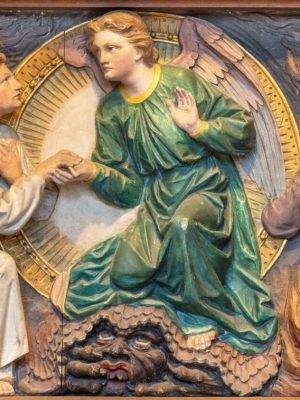Only in the Holy Catholic Faith can you fix your mind upon something so horrific yet marvelous, gruesome yet beautiful, that which you desperately want to avoid yet is that which you will one day willingly throw yourself into. That, Dear Parent, is the awesome reality of purgatory, the residence of the Church Suffering.
This doctrine is so utterly obvious that it baffles the mind that Protestants can reject it. Do you want to know a truly appalling notion? It is that which is held by every Protestant: when you die, so long as you are not bound for hell, you get to immediately show yourself before the throne of Almighty God, with all the filth on your soul that venial sins have left, without the need for penance, without any purification after a sinful life; and vastly more dreadful is the notion that a human soul would proudly walk before the throne of God among the blessed saints and angels without any thought of purgation.
Oh, how we clean our bodies, wash our clothes, polish our shoes, fix our hair, adorn ourselves with jewelry, making ourselves as attractive as possible, simply to attend a cocktail party with halfwits and yuppies who care no more about us than their fancy allows for the fleeting moment.
And yet, we will march into paradise, the heavenly banquet, covered in the stench of pride, the rags of envy, with the growl of greed seething through clenched teeth, and the drool of gluttony seeping down our face, with the blood of wrath on our hands, and the jaded look of sloth in our eyes, and yes, the filth of lust on display for all to see.
The glorious doctrine of purgatory teaches, with countless apparitions to holy saints to support it, that the soul will be scandalized to present itself to God before it is purified in the fires of divine love.
The master of the spiritual life, Father Frederick Faber (1814–1863) explains this beautifully in the small but mighty TAN book simply entitled Purgatory:
“[The soul] goes into Purgatory with its eyes fascinated and its spirit sweetly tranquilized by the face of Jesus, its first sight of the Sacred Humanity, at the Particular Judgment which it has undergone. That vision abides with it still, and beautifies the uneven terrors of its prison as if with perpetual silvery showers of moonlight which seem to fall from our Savior’s loving eyes. In the sea of fire it holds fast by that image. The moment that in His sight it perceives its own unfitness for Heaven, it wings itself voluntary flight to Purgatory, like a dove to her proper nest in the shadows of the forest. There need [be] no Angels to convey it thither. It is its own free worship of the purity of God.”[1]
Father Faber also shares the incredible revelation of St. Gertrude, who was enraptured by God in the following scene:
“The Saint saw in spirit the soul of a religious who had passed her life in the exercise of the most lofty virtues. She was standing before Our Lord clothed and adorned with charity, but she did not dare to lift her eyes to look at Him. She kept them cast down as if she was ashamed to stand in His presence, and showed by some gesture her desire to be far from Him. Gertrude marveled at this and ventured to question Him: “Most merciful God! Why does Thou not receive this soul into the arms of Thine infinite charity? What are the strange gestures of diffidence which I behold in her?”
Then Our Lord lovingly stretched out His right arm, as if He would draw the soul nearer to Himself; but she, with profound humility and great modesty, retired from Him. The Saint, lost in still greater wonder, asked why she fled from the embraces of a Spouse so worthy to be loved; and the religious answered her,
“Because I am not yet perfectly cleansed from the stains which my sins have left behind them; and even if he were to grant me in this state a free entrance into Heaven, I would not accept it; for all resplendent as I look to your eyes, I know that I am not yet a fit spouse for my Lord.”[2]
And so, it is a marvel that Protestants think a sinful man can saunter right through the pearly gates. A truly humble soul desires purgation, knowing that despite the Blood of Christ spilt on Calvary which made salvation possible, he continues to defile his soul in big ways and small.
Thus, Dear Parent, purgatory is a glorious doctrine to teach your children, for it is a splendid means to prepare the soul for the beatific vision.
This beautiful notion of the soul’s willingness to fly into the flames does not, in any way, diminish the brutality of the flames themselves. It has been reported by mystics throughout all of Church history—and even by the souls who have returned from the Church Suffering to warn the Church Militant—that the pain of purgation is greater than all pains of earth combined. It does not take a vivid imagination to conclude how painful this must be if we are incapable of holding our own hand over an open flame for even a few seconds. It is truly mind-boggling. It is, in fact, a mystery that the living cannot fathom. But you, Dear Parent, can listen to the warnings of the holy souls in purgatory and teach your child about this beautiful and horrific reality.
It is vitally necessary to teach your little one to pray for the poor souls in purgatory. They desperately desire it. Countless saints and mystics have testified to the importance of helping the Church Suffering. And even the Angelic Doctor, St. Thomas Aquinas, proclaimed that “prayer for the dead is more acceptable than for the living, for the dead are in the greatest need of it and cannot help themselves, as the living can.”[3]
An estranged friend, who maybe has even left the Church, can freely choose to restore friendship with God and you. But our friends in purgatory can no longer merit their own departure from the flames. You and your family must pray for the dead with sincerity and devotion. It is yet another glorious mystery of God’s infinite compassion that He gives the living such power over the dead.
Father Faber puts beautiful words to this notion:
“While we are helping the Holy Souls, we love Jesus with a love beyond words, a love that almost makes us afraid, yet with what a delightful fear! Because in this devotion it is His hands we are moving, as we would move the unskillful hands of a child. Dearest Lord, that He should let us do these things! That He should let us do with His satisfaction what we will, and sprinkle His Precious Blood as if it were so much water from the nearest well! That we should limit the efficacy of His unbloody Sacrifice, and name souls to Him, and expect Him to obey us, and that He should do so! Beautiful was the helplessness of His blessed Infancy; beautiful is His helplessness in His most dear Sacrament; beautiful is the helplessness in which, for the love of us, He mostly wills to be with regard to His dear spouses in Purgatory, whose entrance into glory His Heart is so impatiently awaiting! Oh, what thoughts, what feelings, what love should be ours as we, like choirs of terrestrial angels, gaze down on the wide, silent, sinless kingdom of suffering, and then, with our own venturous touch, wave the sceptered hand of Jesus over its broad regions, all richly dropping with the balsam of His saving Blood!”[4]
And so, Dear Parent, train your child to pray for the poor souls at every opportunity. At the conclusion of your mealtime, add the following prayer, “And may the souls of the faithful departed, through the mercy of God, rest in peace.” Look for additional prayers to pray with your little one at his or her bedtime routine. And when someone you know or hear about passes away from the mortal coil, gather your family together and pray one of the many prayers for the faithful departed.
If you raise your child to be mindful that members of her Church are suffering in purgatory at this very minute, you will have done a great service. Convince your little one that his or her prayers literally free the Holy Souls from their sufferings. Have your child imagine how grateful these poor souls will be once they reach heaven and how they will return the favor through their prayers.
The point, Dear Parent, is that your child must have a sense of the complete Church, not just the brick and mortar building you attend on Sundays. How often do you hear of someone in need of prayers? You discuss the person in need, you tell your friends and child, you add them to your prayer list. And yet, the tradition proves time and time again that the members of your Church are in purgatory and need your prayers desperately, immediately. This is what it means to be a member of the Church. Please, never let your child forget this truth.
[1] Frederick Faber, Purgatory (TAN Books, 1991), p. 18.
[2] Ibid., pp. 18–19.
[3] Suppl. 3. Part, q. 71, art. 5 ad 3.
[4] Frederick Faber, Purgatory, p. 14.
This article is taken from a chapter in Parenting for Eternity by Conor Gallagher which is available from TAN Books.









